Keratinocyte growth factor induces gene expression signature associated with suppression of malignant phenotype of cutaneous squamous carcinoma cells
- PMID: 22427941
- PMCID: PMC3299721
- DOI: 10.1371/journal.pone.0033041
Keratinocyte growth factor induces gene expression signature associated with suppression of malignant phenotype of cutaneous squamous carcinoma cells
Abstract
Keratinocyte growth factor (KGF, fibroblast growth factor-7) is a fibroblast-derived mitogen, which stimulates proliferation of epithelial cells. The expression of KGF by dermal fibroblasts is induced following injury and it promotes wound repair. However, the role of KGF in cutaneous carcinogenesis and cancer progression is not known. We have examined the role of KGF in progression of squamous cell carcinoma (SCC) of the skin. The expression of KGF receptor (KGFR) mRNA was lower in cutaneous SCCs (n = 6) than in normal skin samples (n = 6). Expression of KGFR mRNA was detected in 6 out of 8 cutaneous SCC cell lines and the levels were downregulated by 24-h treatment with KGF. KGF did not stimulate SCC cell proliferation, but it reduced invasion of SCC cells through collagen. Gene expression profiling of three cutaneous SCC cell lines treated with KGF for 24 h revealed a specific gene expression signature characterized by upregulation of a set of genes specifically downregulated in SCC cells compared to normal epidermal keratinocytes, including genes with tumor suppressing properties (SPRY4, DUSP4, DUSP6, LRIG1, PHLDA1). KGF also induced downregulation of a set of genes specifically upregulated in SCC cells compared to normal keratinocytes, including genes associated with tumor progression (MMP13, MATN2, CXCL10, and IGFBP3). Downregulation of MMP-13 and KGFR expression in SCC cells and HaCaT cells was mediated via ERK1/2. Activation of ERK1/2 in HaCaT cells and tumorigenic Ha-ras-transformed HaCaT cells resulted in downregulation of MMP-13 and KGFR expression. These results provide evidence, that KGF does not promote progression of cutaneous SCC, but rather suppresses the malignant phenotype of cutaneous SCC cells by regulating the expression of several genes differentially expressed in SCC cells, as compared to normal keratinocytes.
Conflict of interest statement
Figures
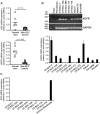

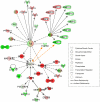


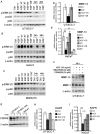
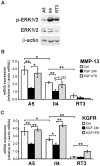
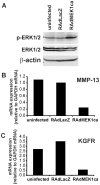
References
-
- Finch PW, Rubin JS, Miki T, Ron D, Aaronson SA. Human KGF is FGF-related with properties of a paracrine effector of epithelial cell growth. Science. 1989;245:752–755. - PubMed
-
- Jameson J, Ugarte K, Chen N, Yachi P, Fuchs E, et al. A role for skin γδT cells in wound repair. Science. 2002;296:747–749. - PubMed
-
- Andreadis ST, Hamoen KE, Yarmush ML, Morgan JR. Keratinocyte growth factor induces hyperproliferation and delays differentiation in a skin equivalent model system. FASEB J. 2001;15:898–906. - PubMed
Publication types
MeSH terms
Substances
LinkOut - more resources
Full Text Sources
Medical
Molecular Biology Databases
Research Materials
Miscellaneous

